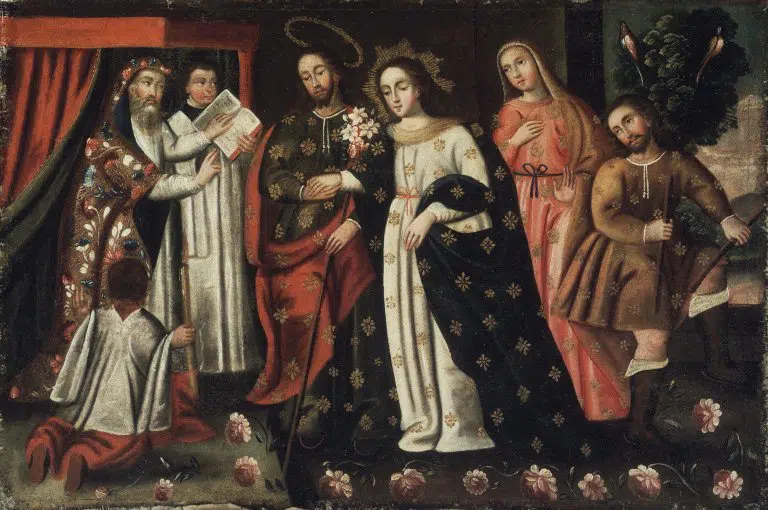Previous articles in this series:
- Part I: Introduction to Humanae Vitae
- Part II: The Predictions of Humanae Vitae
- Part III: The First Prophecy
- Part IV: The Second Prophecy
- Part V: The Third Prophecy
- Part VI: The Fourth Prophecy
- Part VII: Modernity’s Challenges to Humanae Vitae
- Part VIII: The Church’s Right to Teach on Birth Control
- Part IX: The Church’s Teaching Authority
- Part X: Principles of Humanae Vitae
Later articles in this series:
- Part XII: Doctrinal Objections to Humanae Vitae
- Part XIII: Pastoral Guidelines
In our previous article we discussed the doctrinal principles that St. Paul VI established as the foundation of the Church’s absolute prohibition of contraception as an intrinsically and gravely evil act: (1) a whole or integral vision of the human person, (2) the characteristics of conjugal love, and (3) the correct concept of responsible parenthood.
In this article we proceed to explain the Church’s moral norm for marriage in both its prescriptive and its prohibitive forms, as explained by St. Paul VI. We will also clarify that this moral norm of Humanae Vitae is an objective norm, that is, based on objective goods or principles and not just on subjective feelings of conjugal love. Therefore, this article is subdivided into three sections:
- What is the prescriptive norm that Humanae Vitae teaches?
- What is the prohibitive norm that Humanae Vitae teaches?
- Is this norm based on objective goods or on subjective feelings?
The Prescriptive Norm of Humanae Vitae
Once he has established some fundamental principles, St. Paul VI proceeds to evaluate, from the moral perspective, the problem of contraception within the context of conjugal love and the transmission of human life. First, he affirms this moral norm in its positive sense or its prescriptive dimension, i.e., what must be done. The term “prescriptive” simply means “to prescribe,” to command the performance of a certain action (like “feed the poor” or “clothe the naked”).
Later, the Pope affirms the moral norm in its negative sense or its prohibitive dimension, i.e., what must be avoided. The term “prohibitive” simply means to prohibit, to forbid the commission of some evil action (like abortion or contraception).
In the positive sense, Humanae Vitae commands that in the conjugal act, husband and wife remain open to the possibility of transmitting human life: “The Church, nevertheless, in urging men to the observance of the precepts of the natural law, which it interprets by its constant doctrine, teaches that each and every marital act must of necessity retain its intrinsic relationship to the procreation of human life” (11).
Must New Life Come from Every Conjugal Act?
This norm does not at all mean that a new life must ensue from every conjugal act. As a matter of fact, such an occurrence is biologically impossible, as St. Paul VI himself recognizes. In addition, the Pope teaches that the spouses do not commit any sin when they engage in a conjugal act that they foresee to be infertile through no fault of their own. Even in such cases, the Holy Father calls the conjugal act itself “chaste, noble and worthy” when husband and wife truly love each other and are not closed to the possibility of transmitting a new human life:
The sexual activity, in which husband and wife are intimately and chastely united with one another, through which human life is transmitted, is, as the recent II Vatican Council recalled, “noble and worthy.” It does not, moreover, cease to be legitimate even when, for reasons independent of their will, it is foreseen to be infertile. For its natural adaptation to the expression and strengthening of the union of husband and wife is not thereby suppressed. The fact is, as experience shows, that new life is not the result of each and every act of sexual intercourse. God has wisely ordered laws of nature and the incidence of fertility in such a way that successive births are already naturally spaced through the inherent operation of these laws. (11, emphasis added)
What Then Does Humanae Vitae Command?
The positive norm of Humanae Vitae consists in commanding the spouses to always respect the inseparable connection between the unitive meaning and the procreative meaning of the conjugal act:
This particular doctrine, often expounded by the magisterium of the Church, is based on the inseparable connection, established by God, which man on his own initiative may not break, between the unitive meaning and the procreative meaning which are both inherent to the marriage act. (12)
However, respect for the inseparable connection between the unitive and procreative meanings implies a lot more than just abstaining from contraception. Recall that in Humanae Vitae 9 St. Paul VI explained the four characteristics of conjugal love: fully human, total, faithful and exclusive, and fecund. The spouses are called to grow in all of these values and in their love for each other. Each spouse is called to always see his beloved as a gift from God, as end in himself or herself, as a person, and not as an object for selfish pleasure. True conjugal love requires that the husband sees himself as a gift from God to his wife and at the same time to welcome his wife as a gift from God. Likewise, the wife must see herself as a gift from God to her husband and at the same time to welcome her husband as a gift from God. In the words of the Holy Father himself: “Whoever really loves his spouse loves not only for what he receives, but loves that spouse for the spouse’s own sake, content to be able to enrich the other with the gift of himself” (9, emphasis added).

The Wedding Register – Edmund Blair
This dynamic of love as self-gift, together with the practice of self-control, enables the spouses to acquire and practice those virtues that enrich conjugal life and the conjugal act itself: sincerity, honesty, tenderness, affection, and solicitude, among many others.
Openness to Life
Recall that one of the characteristics of true conjugal love is its inherent openness to the transmission of new life. If the spouses truly love each other and avoid contraception, they will be able to develop a deep love for the transmission of life and for their children when God decides to give them this precious gift. Pope Paul VI teaches us that the value of self-control or self-discipline also enables the spouses to
fully recognize and value the true blessings of family life…and confers upon them as parents a deeper and more effective influence in the education of their children. As their children grow up, they develop a right sense of values and achieve a serene and harmonious use of their mental and physical powers. (21)
Why Must the Spouses Always Respect This Inseparable Connection between the Unitive and Procreative Meanings of Marriage?
The answer to this question is astonishing simple: because the nature of true conjugal love demands it. Recall that one of the characteristics of conjugal love is its fertility. The Holy Father explains that true conjugal is inherently open to the possibility of transmitting human life. A conjugal love that deliberately closes itself to life is no love at all; it is a lifeless “love.” As the Holy Father writes of true conjugal love:
This love is fecund. It is not confined wholly to the loving interchange of husband and wife; it also contrives to go beyond this to bring new life into being. Marriage and conjugal love are by their nature ordained toward the procreation and education of children. Children are really the supreme gift of marriage and contribute in the highest degree to their parents’ welfare.
If the spouses, through contraception, destroy their sexual act’s capacity to transmit life, they are not only violating the procreative meaning of the conjugal act, but also its unitive meaning. Contraception is not only anti-life; it is also anti-love.
Let us also recall that another characteristic of conjugal love is that conjugal love is total. It encompasses the whole person. Husband and wife give themselves to each other completely in their conjugal act, leaving nothing out. But if they contracept, then they are leaving out their fertility and not giving themselves completely. Therefore, once again, contraception is contrary to conjugal love and not only to procreation.
The Prohibitive Norm of Humanae Vitae
The prohibitive norm of Humanae Vitae is that nobody may ever deliberately break the inseparable connection between the procreative and unitive meanings of the conjugal act by means of contraception, anti-natural uses of the sexual act (such as sodomy or coitus interruptus), sterilization, or abortion. In the words of St. Paul VI:
Therefore We base Our words on the first principles of a human and Christian doctrine of marriage when We are obliged once more to declare that the direct interruption of the generative process already begun and, above all, all direct abortion, even for therapeutic reasons, are to be absolutely excluded as lawful means of regulating the number of children. Equally to be condemned, as the magisterium of the Church has affirmed on many occasions, is direct sterilization, whether of the man or of the woman, whether permanent or temporary. Similarly excluded is any action which either before, at the moment of, or after sexual intercourse, is specifically intended to prevent procreation—whether as an end or as a means (14).
It is clear from this passage that not only direct abortion and direct sterilization are absolutely prohibited, but also all kinds of contraceptives, whether barrier contraceptives, hormonal contraceptives (which are also abortifacients), or mechanical contraceptives (such IUDs, which are also abortifacients).
Why Is Contraception “Intrinsically and Gravely Evil”?
The act of contraception always violates the intrinsic goods of marriage and of the conjugal act: the unitive and the procreative. Therefore, it is intrinsically evil. Since the goods that contraception violates are at the same time values of great importance (love and life), contraception is also gravely evil. This means that no circumstance or motive can ever justify it. The norm that prohibits contraception in all its forms is an absolute norm, i.e., it admits of no exception.
In addition, if we consider the teachings of St. John Paul II on the theology of the body, we will discover that contraception is also anti-sacrament. The sign of the sacrament of marriage is comprised of (1) the vows that bride and groom exchange during their wedding, and (2) the conjugal act that expresses those vows through the language of the body. The true language of the body, in the case of marriage, includes the conjugal acts that physically express the sign expressed in the words (the marital vows) of the sacrament of marriage. Furthermore, it is clear that the sign of the sacrament of marriage includes the unitive and procreative meanings that God has inscribed in the souls and bodies of husbands and wives, because those meanings are included in the marital vows in one way or another.
But contraception goes against both of those meanings, the unitive and procreative. Therefore, it is a counter-sign, an anti-sacrament.

Wedding of Mary and Joseph – Artist Unknown
Is Contraception a Mortal Sin?
When the spouses possess full knowledge that contraception is an intrinsically and gravely evil act but nevertheless freely and fully will it, they commit a mortal sin. They cannot receive Holy Communion nor enter Heaven upon their deaths.
But if they put their trust in our all-merciful God, repent, promise to amend their lives, go to confession and fulfill the penance imposed by the confessor, they will be filled with God’s infinite mercy and love. They can and should receive Holy Communion and the strength it provides to live righteously and to love God and neighbor. God will heal their lives and lead them to a life of holiness and happiness.
An Objective or Subjective Argument?
It may seem that this whole discussion against contraception is based on subjective arguments because the Holy Father appeals to the subjective characteristics of conjugal love: fully human, total, faithful and exclusive, and fecund.
But we must clarify that we are discussing marriage morality not only from a subjective perspective on the values of conjugal love. We are also discussing marriage morality from an objective perspective. The same values that characterize true conjugal love are at the same time objective goods that God has inscribe in the very beings of the spouses and that they must respect and develop. The spouses who truly love each other and are faithful to God through His Church internalize these objective goods, making them their own. Once the spouses have accepted these goods in their hearts, the goods become values that the spouses cherish and develop so that their love for each other and for their children grows and flourishes.
A value is the internal experience of an objective good. The principal objective goods of marriage (conjugal love, the procreation and education of children, and the sacramental sign) ought to be interiorized and personalized by the spouses, and so become values.
In this way, spouses render justice to the objective and subjective dimensions of conjugal morality and of the whole spectrum of Catholic morality. The objective goods that God’s commandments protect become the interior values that propel good Catholics to act. God’s commandments are no longer seen as “external rules” but as guarantors of that happy life (here and beyond) that the goods protected by the commandments make possible.
Finally, it should be clear that by “subjective” we do not mean at all subjectivism. These two are completely different. In fact, they are opposites of each other. Subjective values correspond to the interiorization of objective goods, while subjectivism is an ideology whose adherents believe that their inner feelings, no matter how wicked, are true for them, even if they are not true for others. Subjectivism leads to relativism and relativism destroys morality completely, because relativism leads to the erroneous belief that morality is subjective and individualistic, and that objective and universal moral norms do not exist.
Having discussed the moral teaching of Humanae Vitae against contraception, we will next respond to the objections against it.
Previous articles in this series:
- Part I: Introduction to Humanae Vitae
- Part II: The Predictions of Humanae Vitae
- Part III: The First Prophecy
- Part IV: The Second Prophecy
- Part V: The Third Prophecy
- Part VI: The Fourth Prophecy
- Part VII: Modernity’s Challenges to Humanae Vitae
- Part VIII: The Church’s Right to Teach on Birth Control
- Part IX: The Church’s Teaching Authority
- Part X: Principles of Humanae Vitae
Later articles in this series:
- Part XII: Doctrinal Objections to Humanae Vitae
- Part XIII: Pastoral Guidelines
Related Content
Adolfo is the Director of Education for Hispanic Outreach for Human Life International and of HLI's Hispanic outreach arm Vida Humana Internacional. He has a Masters in Theology from St. Vincent de Paul Regional (Major) Seminary and a License in Moral Theology from the Alphonsian Academy in Rome.
Adolfo has traveled frequently to VHI’s affiliates in Latin America to give talks, training sessions, and media interviews. He has authored and co-authored books, articles, reports, and a pro-life training course for Hispanics in the U.S. Adolfo has also participated in the production of two TV pro-life series in Spanish, which have been aired through EWTN en Español.















